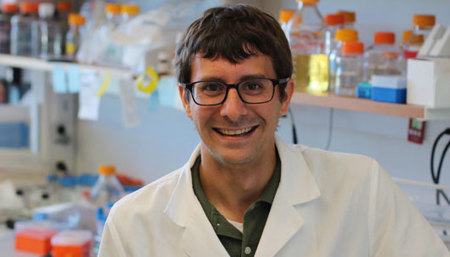Andrew Olive
Assistant Professor, Department of Microbiology, Genetics, & Immunology
Faculty, Cell & Molecular Biology Program
Assistant Professor, BioMolecular Science Gateway
Location: 5198 Biomed Phys Sci
Phone: 517-884-5367
Email: oliveand@msu.edu
Bio
###Education B.Sc., 2007, University of Kansas Ph.D., 2014, Harvard University Post-doctoral studies, 2014-2018, University of Massachusetts Medical School ###Research For the host to survive with an ongoing chronic infection, two distinct immune strategies are required: "resistance" to pathogen replication, and "tolerance" to the infection-associated pathology. My research group combines genetic approaches with in vivo disease models to study chronic infections from both the host and bacterial perspective, focusing on Mycobacterium tuberculosis and Chlamydia trachomatis, the leading causes of infection related death and preventable blindness worldwide, respectively. By defining effective resistance and tolerance mechanisms, we aim to identify targetable aspects of protective immunity that can ultimately be used to develop effective vaccines or host directed therapies. Dissecting Host Resistance and Tolerance Strategies: Even though the importance of both host resistance and tolerance strategies during chronic infections is well appreciated, the pathways driving these responses remain difficult to disentangle. We developed a strategy using novel mouse models that allow us to distinguish resistance mechanisms from tolerance during M. tuberculosis (Mtb) infection in vivo. Using these models, we are dissecting the roles played by protective effectors that are involved in the IFNg pathway including genes that produce reactive oxygen species and nitric oxide, directly target the pathogen containing vacuole and control autophagy. As an example, we uncovered a role for host NADPH phagocyte oxidase (Phox) in controlling tolerance to infection even though it does not directly alter bacterial levels. In the absence of the reactive oxygen species produced by Phox there is unregulated activation of the Caspase-1 inflammasome, increased IL1b production and neutrophil influx into the infected lungs which in turn leads to negative disease outcome. Ongoing studies are aimed at 1) defining mechanisms that control inflammasome activation during persistent bacterial infections 2) understanding the role of IFNg mediated mechanisms in controlling resistance, tolerance or both during infection 3) identifying novel tolerance strategies during persistent bacterial infections. Defining bacterial requirements to survive distinct immune conditions: Our studies examining resistance and tolerance in vivo, strongly suggest that we do not understand the full repertoire of host responses or how these responses directly restrict bacterial growth. Effective control of Mtb infection requires successful activation of macrophages by innate and adaptive responses to enact distinct and diverse effector pathways. In order to fully understand how the functional heterogeneity of the macrophage influences bacterial control, we must understand the various mechanisms that underlie cytokine-mediated killing. We are using a bacterial genetic approach known as transposon sequencing (Tnseq) to define the bacterial environment under distinct cytokine activation conditions. Analysis of differentially required Mtb genes in these conditions uncovered bacterial processes that are influenced by specific macrophage activation conditions. Therefore, distinct aspects of Mtb physiology are conditionally required depending on macrophage activation. We are now using these data to more closely examine how individual macro- and micro-nutrients are differentially required in macrophages following cytokine activation, and uncovering ways to target them during infection. Identifying host networks that modulate bacterial control under distinct immune conditions: Our bacterial genetic studies results raise the larger question of what host pathways directly control Mtb in each activation cytokine activation state? To address this, we have created a genome-wide CRISPR-mediated knockout macrophage library and optimized a robust Mtb-reporter system that distinguishes infected and uninfected cells as well as live or dead Mtb using fluorescent proteins that can be isolated by cell sorting and identified by next generation sequencing. We are using these tools to identify genes that are required to restrict Mtb and defined bacterial mutants following cytokine activation. By linking macrophage effector processes with Mtb resistance mechanisms, we seek a better understanding of the functional requirements for pathogen control in vitro and anticipate extending these findings to improve treatment strategies in vivo.
